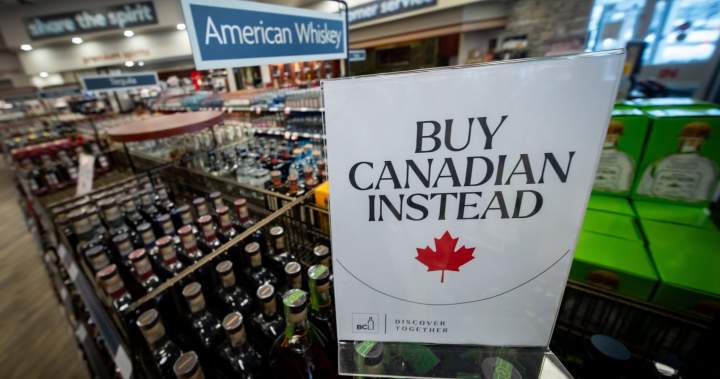The majority of Canadians are continuing to show patriotism with their wallets amid the trade war and tariff policies brought on by U.S. President Donald Trump, according to new Ipsos poll results.
Conducted exclusively for Global News, the latest Ipsos poll of Canadians this month asked respondents how their sense of national pride affects their decisions on purchases, investments and travel destinations.
“Politics gets very involved in commerce. So what you buy isn’t just about whether it’s good or bad — it also says something about your personal values,” says Darrel Bricker, global CEO at Ipsos Public Affairs.
“We’re finding it, in this instance, in decisions about who they want to buy things from. So, being a Canadian patriot, for more than half of us, is expressed through their commercial decisions — at least that’s what they tell us.”
The poll found 56 per cent of respondents said they have bought Canadian products or investments in the past two weeks as a result of the trade tensions between Canada and the United States.
Seventy per cent of baby boomers said so, while that number was at 52 per cent for millennials and 46 per cent for Gen Z.
Ipsos says the correlation of older Canadians being more willing to support domestic businesses is because of their higher purchasing power relative to younger generations.
“Buying Canadian” also doesn’t necessarily paint the whole picture.
The poll asked respondents separately about whether they have gone out of their way to specifically avoid American products, services, investments or travel in the past two weeks — 58 per cent said “yes.”
Older generations were also more likely to avoid American products compared to younger age categories.
A separate Ipsos poll showed Canadians are losing their sense of trust in the U.S. as a result of trade tensions.

Get daily National news
Get the day’s top news, political, economic, and current affairs headlines, delivered to your inbox once a day.
“All of this adds up to bad news for anybody who’s trying to import things from the U.S., and anybody who has an American brand in this country,” says Bricker.
“For people who are selling products and services to Canadians, saying that you’re ‘from Canada,’ what this shows is that there is at least half of the population that says that is something that they’re going to take into consideration.”
The overwhelming majority of Canadians responding to the Ipsos poll said they would continue with these decisions to support Canadian products.
Eighty-two per cent of Canadians say they will continue to prioritize buying Canadian products — even after the trade war is over. This is down slightly from 84 per cent in June, according to the report, but holding steady within the 2.7 per cent margin of error for the poll.
Meanwhile, 57 per cent of respondents say they will continue to avoid American products after tensions subside. That’s down from 64 per cent in August, and 65 per cent in June.
Ipsos says this indicates “a more nuanced approach to purchase decision-making in the coming months.”
Another Ipsos poll conducted exclusively for Global News found that in June of 2025, 72 per cent of respondents said they were actively avoiding U.S.-made goods.
“Patriotic resolve has a cost and that means you may not be able to find what you’re looking for made by a Canadian. So until those products are created, it creates a problem for somebody,” says Bricker.
“I think that at this stage of the game people seem to be committed to doing this but longer term we’ll see if it holds up.“
Although this may all come as good news for Canadian businesses, they may also want to ensure that they are being as transparent as possible when selling products branded as being “Canadian.”
More than half of the poll’s respondents (53 per cent) said if they found a company was exaggerating how “Canadian” their products or services are, then they would stop buying from that company.
This was also more prominent among older generations, with 58 per cent of baby boomers, 49 per cent of Gen X respondents, 53 per cent of millennials and 49 per cent of Gen Z saying so.
This means most consumers may not take what they are offered at face value when something is branded as “Canadian,” and may be more inquisitive about supply chains and product origins.
Many Canadian businesses are actively looking to diversify their supply chains, not only to avoid tariff impacts that can mean higher costs, but also because they know customers may want to avoid U.S. options wherever possible.
“If Canadian suppliers are able to plug into the sentiment that exists right now at a price that’s competitive, with a quality level that’s competitive or better, then the advantage for being ‘Canadian’ is clearly there,” says Bricker.
“If they’re not able to provide quality and the right price, then they’re not going to be able to substitute being ‘Canadian’ for the longer term as being the reason that people should buy what they’re producing.”
© 2025 Global News, a division of Corus Entertainment Inc.
Read the full article here














